Oriol Vinyals: “AI is a fully expanding field that is revolutionizing our world and unravelling a future of unimaginable opportunities”
Oriol Vinyals: “AI is a fully expanding field that is revolutionizing our world and unravelling a future of unimaginable opportunities”
The vice president for Research at Google DeepMind inaugurated the 2023-2024 academic year at UPF, with the lecture “AI: a bridge to the future”. The ceremony took place on 16 October in the auditorium of the Ciutadella campus, and was presided over by Laia de Nadal, rector of the University.
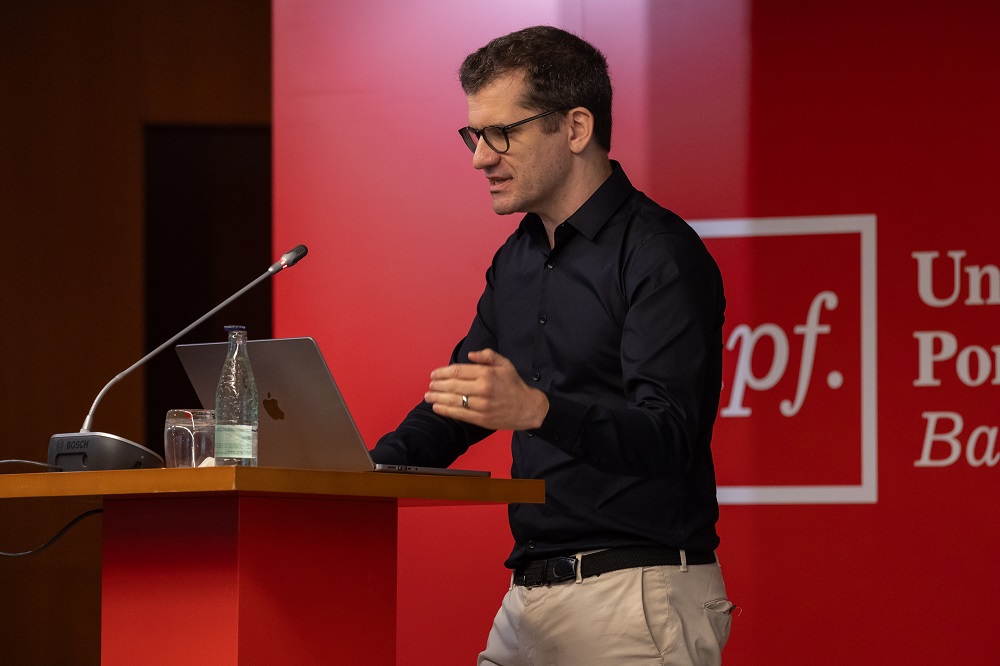
Oriol Vinyals, vice president for Research at Google DeepMind, an expert in artificial intelligence, especially in the fields of machine learning, language and vision, gave the inaugural lecture “AI: a bridge to the future”, opening the 2023-2024 academic year at Pompeu Fabra University.
The academic ceremony, which took place at noon on 16 October in the auditorium of the Ciutadella campus, was presided over by Laia de Nadal, rector of the University. She was accompanied at the table by Victòria Girona, director general of Universities of the Government of Catalonia, and Montserrat Vendrell, chair of the UPF Board of Trustees.
The screening of the videoreport of the 2022-2023 academic year at the University got the proceedings underway, which was followed by a few words of welcome by Laia de Nadal, the inaugural lecture by Oriol Vinyals, the speeches by Montserrat Vendrell and Victòria Girona, and finally, the closure by the rector. The performance of the popular university hymn Gaudeamus igitur by the UPF Choir brought the ceremony to a close, which was broadcast live on the UPF website and on social networks (#InauguracióUPF), and Catalan sign language interpreting was also provided.
> Videoreport of the 2022-2023 academic year
The event began with the screening of the 2022-2023 videoreport, inspired by the work and person of Antoni Tàpies on the occasion of the commemoration this year of the centenary of the artist’s birth. It includes a review of the main milestones achieved by the University during this period, in the areas of community, teaching, research, internationalization, governance and management, social commitment and sustainability, and environment and outreach.
After the screening and a few words of welcome, Laia de Nadal introduced Oriol Vinyals: “We invited him to shed light on artificial intelligence, a highly topical issue in any area of society”, she said. Then, the UPF rector gave the floor to Oriol Vinyals to give his inaugural lecture.
Inaugural lecture by Oriol Vinyals
Oriol Vinyals gave the inaugural lecture “AI: a bridge to the future”, in which he offered “a fascinating overview of the advances of AI, discovering how this discipline constitutes a bridge to a more intelligent and more promising future”.
> Video of the complete inaugural lecture
Excerpts from the lecture
“Learning is a core value for me, it’s an inexhaustible engine that has driven me to dedicate my career to machine learning and exploring the mysteries of AI”.
“There are four fundamental pillars of AI, which have driven scientific advances, areas of application, and investment at unprecedented levels, capturing the attention and interest of society”.
“Framed by these four fundamental pillars (neural networks, unmatched data volumes, cutting-edge hardware, and open software-driven innovation) AI has reached a peak in its development, with a profound and transformative impact on society”.
“Today’s most powerful neural networks have thousands of millions of neurons and weigh about the same as the human brain”.

“Supervised learning, also known as imitation learning, is a teaching method that resembles how children learn from a teacher’s guidance”.
“Another learning algorithm are generative models: a kind of AI algorithms that are capable of creating new content, such as text, images, music, or computer code”.
“This ability to generate language is the engine that drives chatbots, such as ChatGPT or Bard, a different experience to the one offered by Google, more interactive and closer to the dialogue between us and the machine”.
“In fact, the lesson I’m giving today has been prepared with the help of an advanced model of Bard, in a collaboration between human expertise and AI”.
“Systems like ChatGPT or Bard are just the beginning of a journey towards an intelligent digital system”.
“Some uncertainties around AI are the displacement of jobs, especially those that are routine and repetitive [...], bias [...], transparency [...] and privacy [...]”.
“As for opportunities, I would highlight the medical field: thanks to the advances of AI, we can help doctors, and in places where there is no access to doctors and hospitals, predict, diagnose and even cure diseases”.
“Educational tools also provide opportunities and obviously uncertainty, as they can customize aid to students on a large scale without having to pay an additional cost”.
Speeches by the authorities
Speech by Montserrat Vendrell
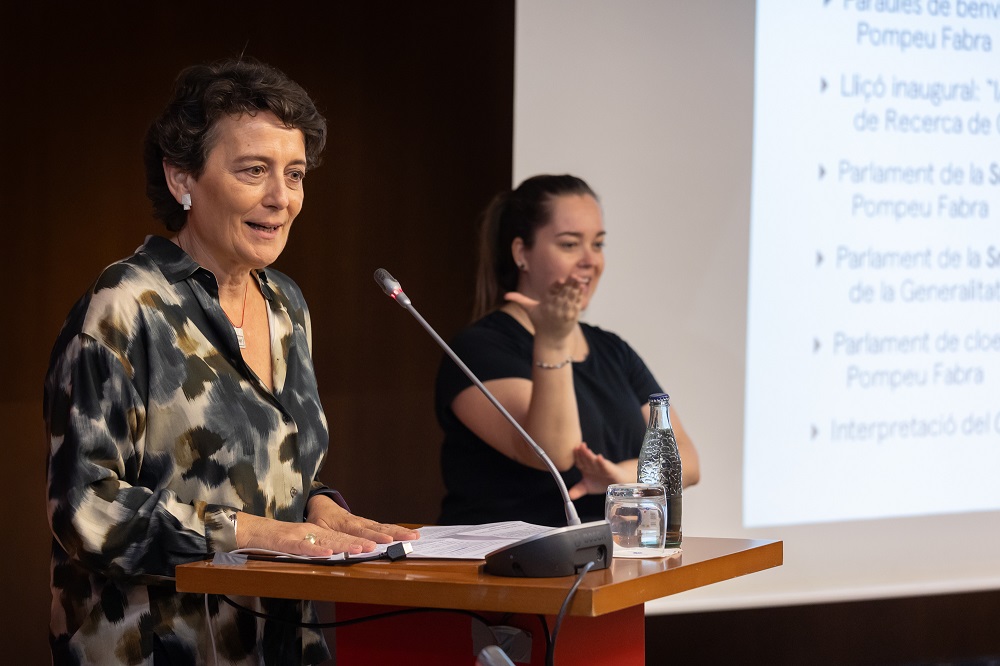
> Speech by Montserrat Vendrell (pdf document)
“The start of the academic year is always full of expectations and challenges, a time to look ahead, but aware of where we come from, where we are and what we can count on to set off on this path”.
“This year, for example, we have a new state university law, the LOSU, which will have to be deployed, jointly ensuring that it fits in the legal context of each autonomous community and also incorporating it into the statutes of each university”.
“This is also the first academic year inaugurated by Laia de Nadal and her governing team, with whom we share many goals, both in the short and long term. Let me say that as far as I am aware, we are the only university where there are two women who hold the positions of rector and chair of the Board of Trustees”.
“We also have a renewed Board of Trustees [...] with the aim of supporting the rectoral team in establishing priorities and actions for implementing during its mandate. Priorities such as innovation, knowledge transfer and equal opportunities”.
Speech by Victòria Girona
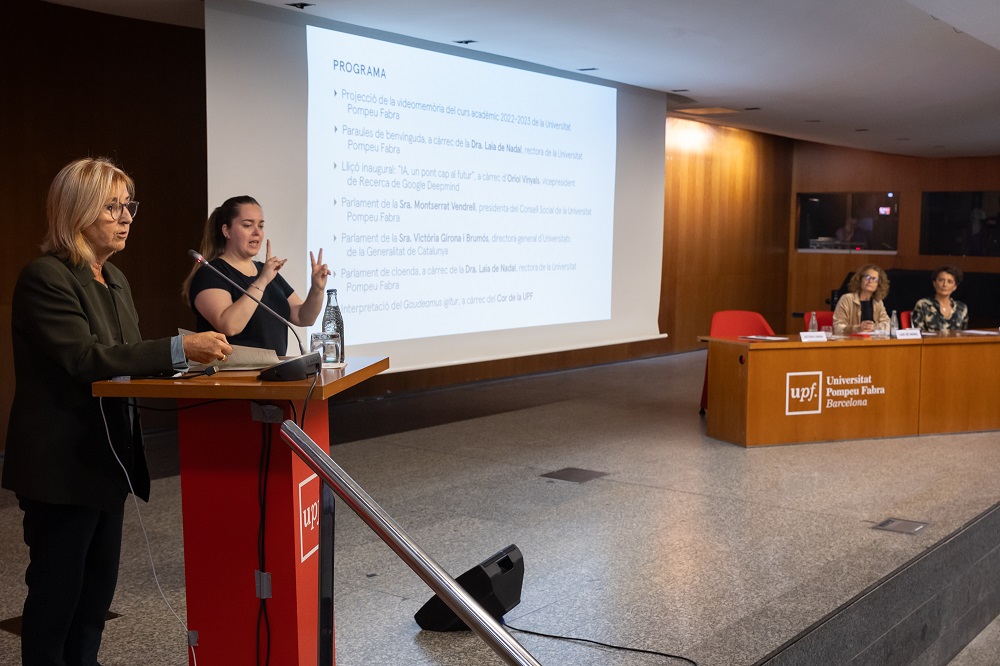
Excerpts from the speech
“I would like to congratulate UPF on its contribution to improving the university and research system in Catalonia”.
“UPF’s international dimension implies the adoption of a series of measures such as the recruitment of quality, international lecturers; participation in a multitude of exchange programmes; the establishment of internships in national and international companies, and teaching in English”.
“We will be facing a year of the deployment of the LOSU and the Catalan Law on Science. We have very clear points at the Department that we are defending in this 2024 budget, whether it is extended or newly drawn up”.
“We wish to increase funding for the University Infrastructure Plan, and we are working to obtain a new plan that will allow universities better planning of the investments needed on their campuses”.
“The major challenge of this 2023 that we have already started and for the following years is to protect talent and promote generational renewal. We are doing this based on a crash plan for teaching and research staff and administrative and services staff”.
“Throughout the processing of the LOSU we were working on and demanding recognition and legislative flexibility [...] We want to open doors, to be able to pass a law so that each university system can develop the model it considers best for its universities and its region”.
“We have held and continue to hold conversations with the Ministry so that the LOSU is the best possible law for the university system of Catalonia, because its uniqueness and its development model, a successful model, as reflected in edition after edition of the rankings, must be protected”.
“I would like to underscore the excellence of the Catalan Research and Universities System, a system of international prestige and renown. This is why it is always necessary to consider the resources poured into the system as an investment and not as an outlay, thanks to the multiplier effects they have on attracting competitive resources”.
“The deployment of the Science Law and its commitment to strengthening the Department’s Directorate General for Knowledge Transfer and Society should help us complete the virtuous circle of research, innovation and transfer. This academic year we will work for its deployment and for the definition of a strategic transfer plan”.
“I would not like to end without highlighting a situation that continues to be of concern and on which Catalan universities must continue to work, which is the gender imbalance that still exists in our university research system”.
versitats catalanes hem de seguir-hi treballant, com és el desequilibri per raó de gènere encara existent en el nostre sistema universitari de recerca."
Speech by Laia de Nadal
> Speech by Laia de Nadal, UPF rector (pdf, 8 pages)
> Vídeo with the complete speech
Excerpts from the speech
“The 2023-2024 academic year must make it possible for and show that, as a university, we are moving forward. UPF, which has stood out from day one for its pioneering and transformative spirit, must again demonstrate that it does not conform and does not allow itself to be guided by inertia and getting by”.
“We have been a university that knew how to interpret the challenges of the present and act with creativity and resolution. And the reality we are facing today is very different from the one that UPF had when it set out more than three decades ago. History has always meant change, but the difference is that today it is at full throttle”.
“What progress would I like the UPF community to make during the academic year we are embarking on today?”
“First: people. Promoting the stabilization and renewal of our staff [...] Therefore, the stabilization and renewal of the PDI and PTGAS is imperative during our mandate”.
“We have come, as I say, from years of constraints. Constraints of the replacement rate that have weighed us down since 2008. But we also have room for manoeuvre to consolidate structure and do so with a rejuvenated, more egalitarian and involved team. A team that feels that UPF is its own exciting project”.
“Another expression of this progress I want to become visible, the second step forward: in the 2023-2024 academic year we want to strengthen our community, a plural and complex community”.
“In short, we want to work positively, decisively and collaboratively, always putting people first. As you know, this academic year we have to draw up new UPF Statutes. It will be a real litmus test to show that things can and should be done properly, listening to everyone”.
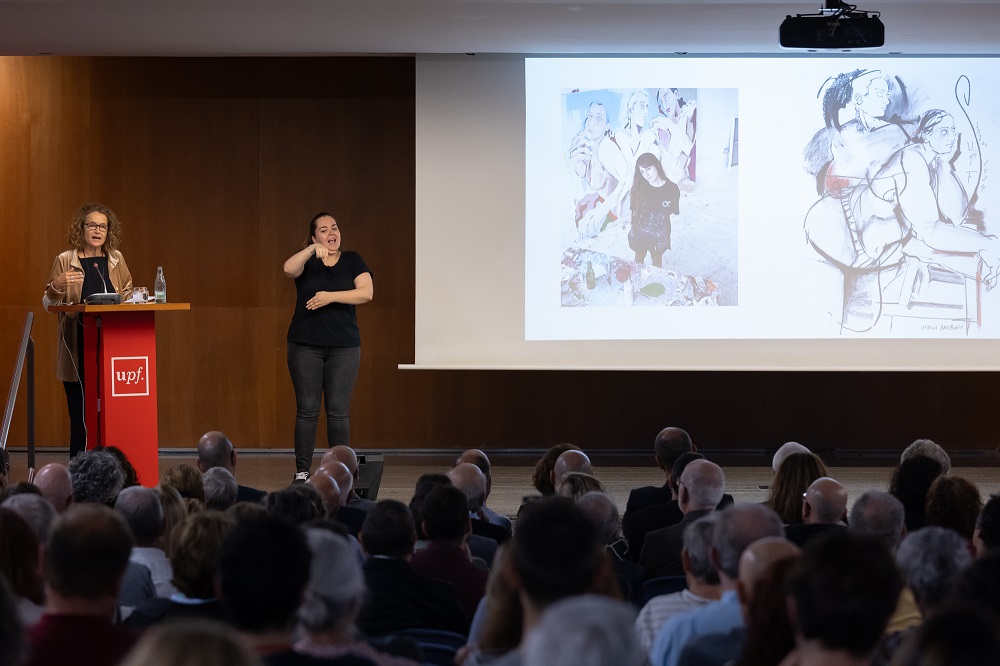
“Moving on to the third point. In this new academic year we must underpin the transformative approach that has always characterized us. I said so at the beginning. We have always been pioneers and have become a model for many things within the system. We want to continue along these lines, of course. That is why I say that it is very important to understand and apply the transversality of our power of transformation”.
“Ultimately, transforming is going from ideas to deeds. And it is clear to me that this academic year needs giving impetus and order to the Planetary Wellbeing project and the entire knowledge and innovation complex of the old Mercat del Peix”.
“Finally. Point four. The 2023-2024 academic year must be one of real change in the intensification of research and the reinforcement of its social impact. I refer to a profound, cultural change that filters through all tangible and intangible areas of the university”.
“Another common denominator is the importance we wish to give to harnessing funds and to alliance with social agents, companies and entities [...] Internationalization is also a common thread of our way of understanding research and transfer”.
“We don’t want to go blindfold. We want to know if we achieve the quality and objectives set and we can do this by incorporating data analytics into decision-making and defining the indicators relevant to our goals”.
“Today I have only described the four key pillars with which we want to move forward and that will draw the lines for this 2023-2024 academic year: the stabilization and renewal of staff, the consolidation of the community, transformation and innovation and, finally, the consolidation of the culture of science and transfer”.
“Last academic year we tuned the instruments and the first notes began to be played. The work done so far and the work we are committed to doing, is what you’ll need to appraise. Openly and with solid, constructive criticism when needed”.
Upon concluding her speech, the rector, Laia de Nadal, declared the UPF 2023-2024 academic year open. The performance of the popular university hymn Gaudeamus igitur with the entire audience standing, brought the event to a close.
Expert in artificial intelligence and deep learning
Oriol Vinyals (Sabadell, 1983) studied the double bachelor’s degree in Telecommunications Engineering and Mathematics at the Polytechnic University of Catalonia. Subsequently, after completing his degree final project at Careneige Mellon University (Pittsburgh, USA), one of the most renowned research centres in higher education in the field of computer science and robotics, he made a stay at the University of California, Berkeley. To continue his specialization, he took a master’s degree in Computer Science at the University of California San Diego and a doctoral degree in Electrical Engineering and Computer Sciences, again at the University of California, Berkeley.
Between 2008 and 2009 he made several summer stays at Microsoft and Google, and in 2011 he obtained a PhD scholarship from Microsoft. Having received several offers from US technology and finance companies, he chose Google, where he surrounded himself with the best scientists in the world and was able to devote himself to developing research projects.
A few years later, in 2013, he joined Google Brain, where he made significant contributions to deep learning techniques in machine learning text, speech, and vision. In 2016 he joined the former DeepMind group (now Google DeepMind), where he has since been researching deep learning and artificial intelligence, and where he currently holds the position of vice president for Research.
In this English company, he is technical co-leader of the Gemini artificial intelligence system and team leader of the deep learning group, an area in which he is a world-renowned expert: together with his team, Vinyals developed a technology that is now used in Gmail’s intelligent response and has made decisive contributions to commercial translation systems. He has also participated in the development of the technology used by Google Image Search, which enables finding images related to the search performed. Among many other projects, at DeepMind he has contributed to the development of Alphastar, an artificial intelligence algorithm that plays the video game StarCraft II.
The inaugural poster for the 2023-2024 academic year, the work of the artist Cristina BanBan
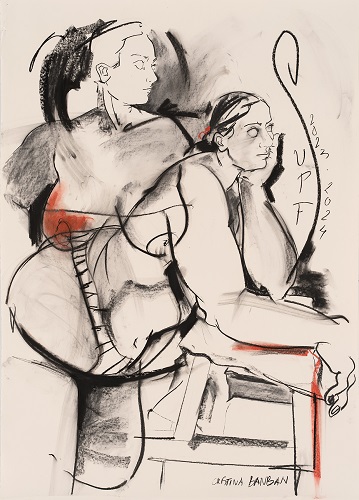
Cristina BanBan (El Prat de Llobregat, 1987), is the artist signing this year’s inaugural poster for the new academic year of the University, a work based mostly on pen drawing, expressive in gesture, that connects with the concepts of freshness and innovation. The two female bodies that appear are representative of her work, and in this case, according to BanBan, she chose the figure of the “thinker”, referring to Rodin’s sculpture, which is at the same time a symbol of a dreamer and of creation.
Cristina BanBan learned to draw as a child and graduated in Fine Arts from the University of Barcelona (2010), but gained experience touring Europe thanks to artist residences. Her work has been displayed in exhibitions around the world, at the Royal Academy of Art in London, The Hort Family Collections in New York, and Fondation Louis Vuitton in Paris.
She is known for her semi-autobiographical portraits of nudes, in a “Rubenesque” and neoclassical style: her work is characterized by the representation of voluptuous figures, domestic scenes and highly colourful canvases. With regard to the technique employed, she creates her works using lithography, acrylic paint and mixed media collage.
The work of BanBan, who currently lives in New York, explores the human emotional and psychological state, and often leans towards representations of melancholy, intimacy and loneliness. She has received several awards throughout her career, including the Hackney WickEd Art Prize (2016) and the award granted by The Arts Club Prize of the Royal Academy of London (2017), in recognition of the best work (except architecture) by an artist under 35 years of age.
> Gallery of images of the inaugural ceremony posted on Flickr

